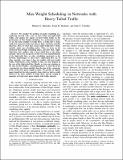Max-weight scheduling in networks with heavy-tailed traffic
Author(s)
Markakis, Mihalis G.; Modiano, Eytan H.; Tsitsiklis, John N.; Markakis, Michail; Modiano, Eytan H; Tsitsiklis, John N; ... Show more Show less
DownloadMihalis_Infocom2012 copy.pdf (296.5Kb)
OPEN_ACCESS_POLICY
Open Access Policy
Creative Commons Attribution-Noncommercial-Share Alike
Terms of use
Metadata
Show full item recordAbstract
We consider the problem of packet scheduling in a single-hop network with a mix of heavy-tailed and light-tailed traffic, and analyze the impact of heavy-tailed traffic on the performance of Max-Weight scheduling. As a performance metric we use the delay stability of traffic flows: a traffic flow is delay stable if its expected steady-state delay is finite, and delay unstable otherwise. First, we show that a heavy-tailed traffic flow is delay unstable under any scheduling policy. Then, we focus on the celebrated Max-Weight scheduling policy, and show that a light-tailed flow that conflicts with a heavy-tailed flow is also delay unstable. This is true irrespective of the rate or the tail distribution of the light-tailed flow, or other scheduling constraints in the network. Surprisingly, we show that a light-tailed flow can be delay unstable, even when it does not conflict with heavy-tailed traffic. Furthermore, delay stability in this case may depend on the rate of the light-tailed flow. Finally, we turn our attention to the class of Max-Weight-α scheduling policies; we show that if the α-parameters are chosen suitably, then the sum of the α-moments of the steady-state queue lengths is finite. We provide an explicit upper bound for the latter quantity, from which we derive results related to the delay stability of traffic flows, and the scaling of moments of steady-state queue lengths with traffic intensity.
Date issued
2012-05Department
Massachusetts Institute of Technology. Laboratory for Information and Decision SystemsJournal
2012 Proceedings IEEE, INFOCOM
Publisher
Institute of Electrical and Electronics Engineers (IEEE)
Citation
Markakis, Mihalis G., Eytan H. Modiano, and John N. Tsitsiklis. "Max-Weight Scheduling in Networks with Heavy-Tailed Traffic." INFOCOM, 2012 Proceedings IEEE, 25-30 March, 2012, Orlando, FL, IEEE, 2012, pp. 2318–26.
Version: Author's final manuscript
ISBN
978-1-4673-0775-8
978-1-4673-0773-4
978-1-4673-0774-1